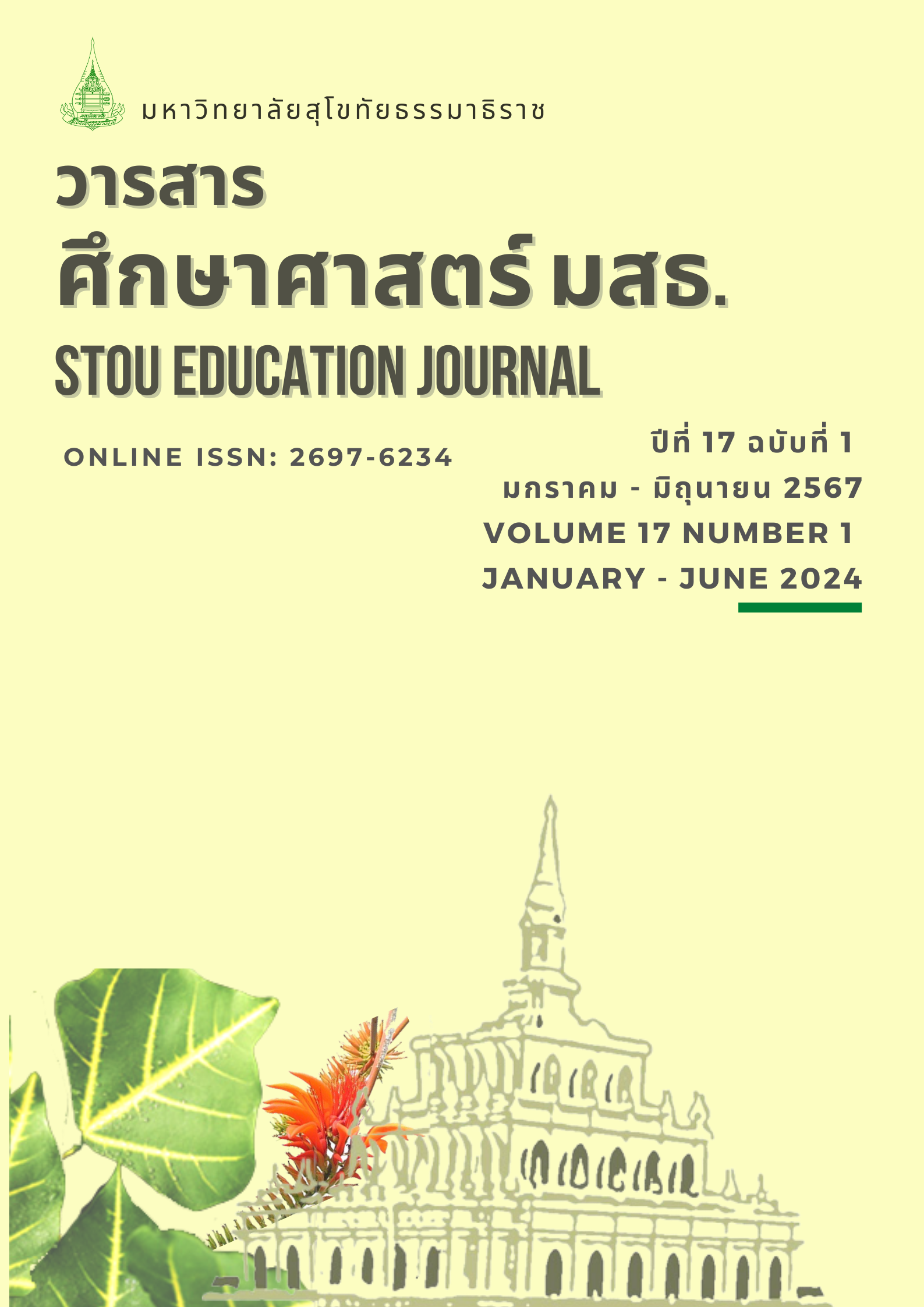Development of a Competency Assessment for External Evaluators at the Basic Education Level
Main Article Content
Abstract
The objectives of this study were to 1) develop a competency assessment for external evaluators at the basic education level, 2) validate the competency assessment for external evaluators at the basic education level. The sample consisted of 350 external evaluators at the basic education level, which was determined by Taro Yamane formula, with a margin of error of 5% and a confidence level by 95%. The sampling was carried out proportional to the number of evaluators in 37 External Quality Assessment Units, obtained by simple random sampling. The employed research instrument was a competency assessment scale for external evaluators at the basic education level; composing of content validity, construct validity, discriminating power and reliability coefficient. Research findings were as follows: 1) The developed a competency assessment for external evaluators at the basic education level had three factors including, knowledge competency domain with of three indicators, skill competency domain with of four indicators, and attribute competency domain with of two indicators. 2) Content validity of the competency assessment ranged from .57 to 1.00. For the Construct validity, the result revealed that (21) measuring the goodness of fit between the model and empirical data was 35.69, goodness of fit index (GFI) of .98, adjust goodness of fit index (AGFI) of .95, comparative fit index (CFI) of .99, standard root mean square (SRMR) of .03. Discriminating power ranged from .30 to .76. Reliability coefficient was .89
Article Details
References
กรุณา จันทุม. (2017). การสร้างเครื่องมือวัดคุณภาพชีวิตที่เกี่ยวข้องกับสุขภาพประเภทสเกล. Journal of Medicine and Health Sciences, 24(3), 11-21.
เกื้อ กระแสโสม. (2547). การพัฒนาการรับรองผู้ประเมินภายนอกตามแนวคิดที่เน้นสมรรถภาพสำหรับการประเมินสถานศึกษา [วิทยานิพนธ์ดุษฎีบัณฑิต ไม่ได้ตีพิมพ์]. จุฬาลงกรณ์มหาวิทยาลัย https://www.onesqa.or.th/th/contentlist-view/1212/2800/
จิตด์ โชติอุทัย. (2550). สมรรถนะของผู้ประเมินภายนอกระดับการศึกษาขั้นพื้นฐานในภาคใต้. [วิทยานิพนธ์ปริญญามหาบัณฑิต ไม่ได้ตีพิมพ์]. มหาวิทยาลัยสุโขทัยธรรมาธิราช.
เครือมาศ เพชรชู. (2556). ความสัมพันธ์เชิงสาเหตุของปัจจัยการจัดการศึกษาที่มีอิทธิพลต่อการคิดอย่างมีวิจารณญาณของนักศึกษาพยาบาลวิทยาลัยพยาบาล สังกัดกระทรวงสาธารณสุข. วารสารพยาบาลและการศึกษา, 6(2), 42-55.
บุญใจ ศรีสถิตนรางกูร. (2555). การพัฒนาและตรวจสอบเครื่องมือวิจัย : คุณสมบัติการวัดเชิงจิตวิทยา. โรงพิมพ์แห่งจุฬาลงกรณ์มหาวิทยาลัย.
พล เหลืองรังษี. (2566). เอกสารประกอบการสอนการวัดผล การประเมินผล และการประกันคุณภาพการศึกษา.พิกเซล ดีไซน์ แอนด์ พริ้นท์.
พิมพนิต คอนดี, ณัฐสุดา เต้พันธ์, และ กุลยา พิสิษฐ์สังฆการ. (2560). การพัฒนาแบบวัดการยอมรับฉบับภาษาไทยและคุณสมบัติทางจิตมิติเบื้องต้นสำหรับบุคคลภายหลังการรักษาโรคมะเร็งเม็ดเลือดขาว. วารสารพยาบาลทหารบก, 18, 174-180.
สุภมาศ อังศุโชติ, สมถวิล วิจิตรวรรณา, และ รัชนีกูล ภิญโญภานุวัฒน์. (2557). สถิติวิเคราะห์สำหรับการวิจัยทางสังคมศาสตร์และพฤติกรรมศาสตร์: เทคนิคการใช้โปรแกรม LISREL (พิมพ์ครั้งที่ 4). เจริญดีมั่นคงการพิมพ์.
สายวรุณ สุกก่ำ, เอกสิริ แก่นศักดิ์ศิริ, และ อุทุมพร โดมทอง. (2561). สหสัมพันธ์ภายในชั้น (Intraclass Correlation). http://sc2.kku.ac.th/stat/statweb/images/Eventpic/60/Seminar/02_5_Intraclass-Correlation.pdf
สุกัญญา รัศมีธรรมโชติ. (2548). แนวทางการพัฒนาศักยภาพมนุษย์ด้วย Competency Based Learning.ศิริวัฒนา อินเตอร์พริ้นท์.
สุมาลี ศรีพุทธรินทร์. (2550). การพัฒนาแบบจำลองเพื่อรับรองผู้ประเมินภายนอกในการประเมินคุณภาพการศึกษาระดับการศึกษาขั้นพื้นฐาน. [วิทยานิพนธ์ดุษฎีบัณฑิต ไม่ได้ตีพิมพ์]. มหาวิทยาลัยมหาสารคาม.
สำนักงานรับรองมาตรฐานและประเมินคุณภาพการศึกษา (องค์การมหาชน). (2564ก). ขั้นตอนการประเมิน QC100 สำหรับสถานศึกษา ‘รูปแบบ Mobile’. https://www.facebook.com/464932193518413/posts/4576869272324664/
สำนักงานรับรองมาตรฐานและประเมินคุณภาพการศึกษา. (2564ข). ข้อบังคับคณะกรรมการสำนักงานรับรองมาตรฐานและประเมินคุณภาพการศึกษา ว่าด้วยการรับรอง การต่ออายุ และการควบคุมการปฏิบัติหน้าที่ของผู้ประเมินภายนอก พ.ศ.2564. http://www.onesqa.or.th/upload/download/202102241158498.pdf
สำนักงานรับรองมาตรฐานและประเมินคุณภาพการศึกษา. (2566). ร้อยละของจำนวนสถานศึกษาที่ได้รับการประเมินฯ ปี 2564-2565 และเผยแพร่รายงานฯแล้ว ต่อจำนวนสถานศึกษาทั้งหมด จำแนกตามระดับสถานศึกษา. https://aqa2.onesqa.or.th/#dashboard
อรุณ จิรวัฒน์กุล. (2553). การวัดความสอดคล้องด้วยสถิติ. วารสารวิชาการสาธารณสุข, 19(1), 1-2.
Education, A. (2017). Assuring quality in education: Policies and approaches to school evaluation in Europe. EU: European Union, 39.
https://policycommons.net/artifacts/193638/assuring-quality-in-education/619920/
Krishnamurthy, R., & Yalof, J. A. (2010). The assessment competency. In M. B. Kenkel & R. L. Peterson (Eds.), Competency-based education for professional psychology, 87–104. American Psychological Association. https://psycnet.apa.org/doiLanding?doi=10.1037%2F12068-005
Roengsumran, A. (2015). A Study of External School Evaluators' Competencies for Grade Levels 1-12 Quality Assessment in Thailand [Doctoral dissertation, University of Minnesota]. ProQuest Dissertations & Theses Global.


